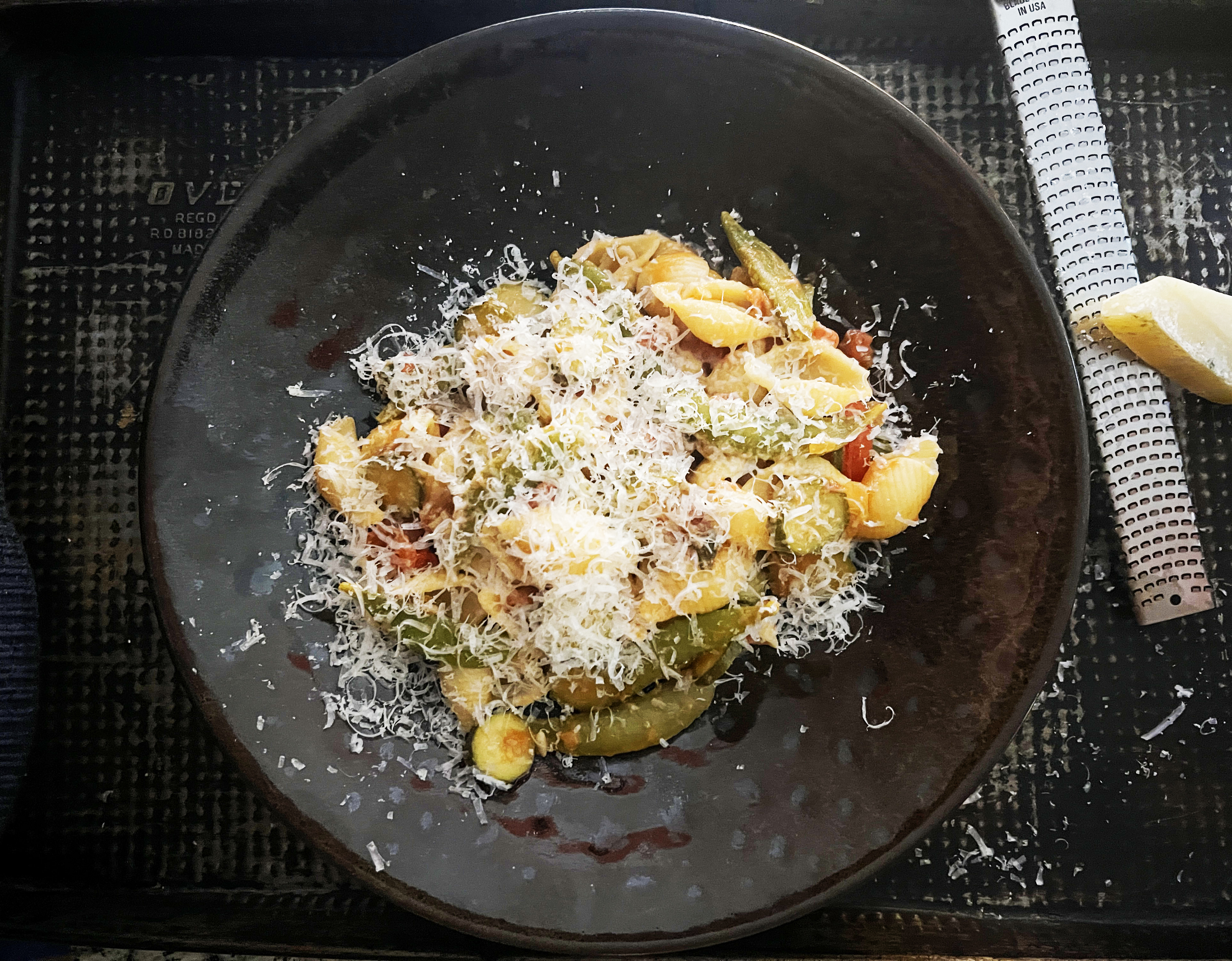For all the myriad recipes I try to cook, it’s always the pasta that brings the most compliments. And, with few exceptions, that’s because of two things I almost invariably include: wine, and water. Yes, water. Cream, now and then, but a pasta sauce certainly does not have to be awash with cream.
That water in which you have just finished cooking your pasta until it is perfectly al dente – that is the secret to finishing a good pasta sauce, but white wine is the secret that comes first, so that it blesses all the other elements that are cooked with it. The starch in the pasta water helps emulsify and enrich the texture of the sauce.
The wine goes in relatively early on. If there’s going to be onion and garlic in my sauce, I’ll sauté them first, in olive oil, before adding a glass of sauvignon blanc or chenin or whatever white wine is to hand, and cook them down for a few minutes until it gets a bit syrupy.
If mushrooms are in the recipe, there most likely won’t be any tomato, so the sliced mushrooms will follow the onions into the saucepan. (I’m not a fan of mushrooms and tomatoes in the same mix, they both lose something when in company with the other, and neither gains anything.) I don’t add cream to many pasta sauces, but I would if mushrooms were the hero ingredient, so that would go in next. Mushrooms and cream are one of the magic marriages of the kitchen.
But it’s most often pasta water that “marries” my pasta sauces, outside of cooking with mushrooms.
The pasta section of my kitchen cupboards invariably has half full packets of this or that pasta, and for two of us, half a packet of pasta is more than enough. So, I’ll have a look to see what pasta we have, then check the fridge for fresh vegetables or perhaps jars of olives, capers and the like. A few courgettes make a good starting point, and I had bought some sugarsnap peas. That pair, with some perky, bright red roma tomatoes, would make a simple pasta sauce with some veggie substance in it, although I am not at all averse to a pasta sauce with not “bits” in at all.
There might be ham or bacon in the fridge, and both are lovely in a pasta sauce. And they go with almost anything.
Enjoy Tony Jackman’s writing and way with food? Sign up to Tony’s weekly newsletter here. It’s free, and in your inbox every Friday afternoon. If it goes to promotions or spam at first, please drag it into your inbox.
A can of decent quality chopped, peeled tomatoes is a winning ingredient in many pasta sauces, and completing it all, often, is a good cheese component. Maybe some blue cheese, chopped and stirred in, or the obvious crowd pleaser, Parmesan. This I sometimes use two ways: a good cup of it stirred into the sauce, and often some more grated on top to finish. It’s that cupful of parmesan in the sauce that elevates the entire sauce and consequently the taste and texture of the pasta it is served with.
Another trick is speed: to work quickly, which means you need to have your ingredients chopped and ready to go into the pot. Unless you’re making a slow-cooked ragu, most pasta sauces benefit from being made swiftly and eaten straight away. It is not a meal to make ahead.
So, start by checking the pasta stocks and the fridge. Here’s what I found in there this week: in the pasta cupboard, pasta shells. (And no, that they are shells does not mean they need to be reserved only for seafood.) In the fridge: sugarsnap peas, six courgettes, parmesan, and a quarter bottle of sauvignon blanc. There’s a pasta sauce, ready to go…
Pasta shells with courgettes and sugarsnap peas
(Serves 2)
Ingredients
100 g pasta shells
3 Tbsp olive oil (but honestly, I pour, I don’t measure)
1 medium onion, finely chopped
2 garlic cloves (or more), crushed and chopped
A glass of sauvignon blanc or other white wine
6 courgettes
100 g sugarsnap peas
About 12 baby roma tomatoes, halved
1 x 400g can chopped, peeled tomatoes
Salt and black pepper to taste
2 ladles of pasta water
1 cup grated Parmesan for the sauce and more to finish
Method
Bear in mind that you need to bring a pot of lightly salted water to the boil and cook your pasta until al dente while also making the sauce. Remember not to drain ALL of the pasta water away; reserve 2 ladles of it for the sauce.
Peel off the strings on the peas, but leave the pods whole.
Top and tail the courgettes and slice them.
Peel and chop the onions and garlic.
Slice the little tomatoes in half.
In a saucepan, heat the olive oil on a low to moderate heat and add the onions. Stir, throw in the garlic, and simmer until soft but not taking on colour.
Add the wine and bring to a fairly rapid boil. Let it cook till there’s about a third of it left.
Add the courgettes and peas and toss; cook gently for a few minutes.
Add the tomatoes and the can of chopped tomatoes, bring to a simmer, and cook for five minutes.
Season with salt and pepper and stir in 2 ladles of pasta water. Let it simmer for a few minutes.
Stir in the grated Parmesan, toss through the drained pasta, and serve with more grated Parmesan. DM
Tony Jackman is Galliova Food Writer 2023, jointly with TGIFood columnist Anna Trapido. Order his book, foodSTUFF, here
Follow Tony Jackman on Instagram @tony_jackman_cooks.
This dish is photographed in a bowl by Mervyn Gers Ceramics.





